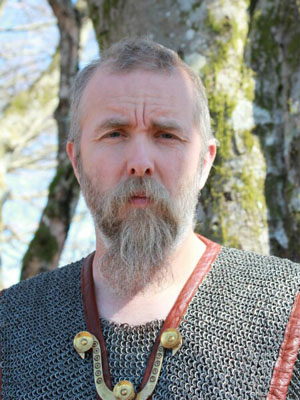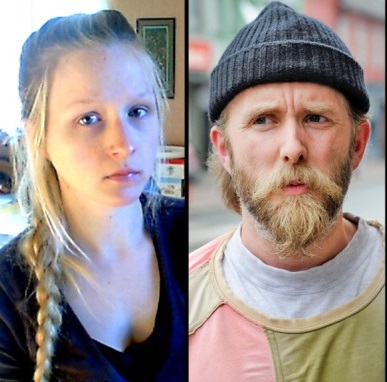Andrew Joyce
Occidental Observer
June 29, 2014

Musician Kristian ‘Varg’ (Wolf) Vikernes, who recently went on trial in France for ‘inciting racial hatred and glorifying war crimes,’ isn’t a household name. Even within the extreme heavy metal scene he helped create back in the early 90s his name is slowly diminishing if not into oblivion, then into ignominy. He is, however, an interesting character and the story of his persecution, first in his native Norway and now in France, is worth chronicling for TOO readers.
Born in 1973, Vikernes was the son of an electronics engineer and an oil company employee. When he was about 6 years old, the family moved for about a year to Baghdad, Iraq, because Vikernes’ father was then working for the Iraqi regime developing a computer program. Since there were no places available in the English school in Baghdad, the young Vikernes went to an Iraqi elementary school during this time. Vikernes claims it was then that he became aware of racial matters. Corporal punishment was not uncommon in the school, and on one occasion Vikernes had a quarrel with a teacher and called him “a monkey.” But, as Vikernes perceived it, the teachers “didn’t dare to hit me because I was white.” Vikernes’ mother also recalls how they spent a year in Iraq, and that “the other children in his class would get slapped by their teachers; he would not.” In general, both of his parents appear to have been racially conscious. His father would frequently express anxieties about the increasingly multi-ethnic makeup of their hometown. About his mother, Vikernes says that she was “very race conscious,” in the sense that she was afraid that Vikernes “was going to come home with a black girl.”
The teenaged Vikernes founded the one man music project Burzum in 1991, quickly establishing himself as a precocious and formidable musical talent. In doing so he became part of an emerging Norwegian black metal scene. Although now dominated by often ridiculous pageantry, kitsch and costuming, the early black metal scene was a reaction against the bloated commercialism of American metal music. Superficially, the music was thematically pre-occupied with anti-Christian lyrics, but beneath this tactical move for shock-value were deeper ideas and inspirations: disillusionment with the direction of modern society, hypocrisy in religion, the loss of European identities, the dark and foreboding Nordic landscape, and even the harsh northern weather itself.
Above all it was a reaction by Norwegian youth against ‘equality’ and the bland tyranny of Social Democracy. It represented the creation of a postwar subculture by a youth which still strove for individualism and elitism — for a new world and a new way of life. Many of its earliest lyricists looked to the past for a viable alternative to the banality of contemporary life in Social Democratic Norway, finding inspiration and expression in ‘volkisch’ celebrations of pre-modern, pre-Christian Scandinavia, particularly the Viking age. Writing in 2012, Vikernes, who was at the forefront of this development, recalled the profound disillusionment and apathy he felt at the time, and shared with a large contingent of Norwegian youth:
Burzum came about not because I wanted to make music or indeed sought fame and fortune (as if I have any of that now…). No. Instead Burzum came about because I had nothing better to do. Nothing interested me. Nothing was worth working for or fighting for. And — dear Pagan God — I certainly did not want to spend the rest of my life amongst domesticated people. “Sheeple”. Naturally I had a hope the world would be destroyed completely in a WWIII, so that we could start fresh and build something better instead on the ruins of the old world, and whilst waiting I played the guitars in my boy’s room. But as we all know that hope was crushed when the Berlin Wall fell and the Soviet Union ceased to exist. All I was left with was that old guitar and nothing else to do. I honestly wish I had done something else instead. Something more private. Something that I didn’t need to share with the world in order to make a living of it. The only problem is that I really cannot tell what that could have been. It was already too late to enlist in the Waffen-SS, and those guys were pretty uniform, so I probably wouldn’t have fitted in very well anyhow, and it was certainly too late to embark on a long-ship and teach those wanna-be-Jews elsewhere in Europe that Europeans are not supposed to kneel in front of any foreign false “gods.”
After recording two Burzum demo tapes, he attracted the attention of Øystein “Euronymous” Aarseth of Mayhem, who had just recently formed Deathlike Silence Productions. Euronymous then signed Burzum to the label, and shortly after, Vikernes ― under the pseudonym of Count Grishnackh, began to record Burzum’s self-titled debut album. Burzum‘s eponymous debut album was released in 1992, being the second album released on Deathlike Silence Productions. However, relations between Vikernes and the unusual and profoundly antisocial Euronymous were tense. Five years older than Vikernes, Euronymous viewed the purpose and ethos of the black metal scene very differently, seeing it primarily as a vehicle for hedonism and Satanism. He frequently disturbed his fellow bandmates, and played music and fired a shotgun in frenzied efforts to prevent them from sleeping. When lead singer, Per ‘Dead’ Ohlin committed suicide with a shotgun in the band’s forest cabin in 1991, Euronymous went to a store and bought a disposable camera to take pictures of the scene before deciding to call the police. He later used one of the photographs of Ohlin’s corpse as an album cover, and made necklaces with recovered pieces of Ohlin’s skull. In a 1993 interview Euronymous stated that “there is NOTHING which is too evil, sick or perverted.”
The younger, more idealistic, Vikernes and Euronymous began to clash. In early 1993, animosity arose between Euronymous and Vikernes. On the night of August 10 1993, Vikernes drove from Bergen to Euronymous’s apartment at Tøyengatain Oslo. Upon his arrival a confrontation began and Vikernes fatally stabbed Euronymous. Vikernes has always claimed that he attacked Euronymous in self-defense, and that an increasingly demented Euronymous had plotted to stun him with an electroshock weapon, tie him up and torture him to death while videotaping the event. Vikernes explained: “If he was talking about it to everybody and anybody I wouldn’t have taken it seriously. But he just told a select group of friends, and one of them told me.” He said Euronymous planned to use a meeting about an unsigned contract to ambush him. A bandmate stood outside smoking while Vikernes climbed the stairs to Euronymous’s apartment on the fourth floor. Vikernes said he met Euronymous at the door and handed him the contract, but when he stepped forward and confronted Euronymous, Euronymous panicked and kicked him in the chest. The two got into a struggle.
The fight moved to the kitchen, where both grasped for a knife on the table, and Vikernes stabbed Euronymous to death. Vikernes was arrested on 19 August 1993 in Bergen. On 16 May 1994, Vikernes was sentenced to 21 years in prison (Norway’s maximum penalty) for the slaying. Many of Euronymous’s friends and bandmates were indifferent to the killing, seeing Euronymous as a dangerous liability who was drinking too much of his own Kool-Aid. Anders Odden (a friend of Euronymous at the time) said of the murder: “It wasn’t odd that he ended up getting killed. He thought he could threaten to kill people without it having any consequences.” He added: “I think many people felt relief once he was gone.”
Despite the extenuating circumstances surrounding the death of Euronymous, the involvement of black metal and Vikernes’ own outspoken anti-establishment views led to his portrayal as perhaps the original Norwegian media boogeyman, replaced only recently by Anders Breivik. (And interestingly Vikernes was one of the 530 individuals to receive a mailed copy of Breivik’s manifesto). Vikernes trial was suspect for a number of reasons, and shortly after his term of imprisonment began several anti-fascist organizations began monitoring the writings that he produced from behind bars, in particular Antifa, Monitor (a private intelligence service dedicated to monitoring all so-called right-wing activity and dissidents in Norway) and Antirasistisk Senter (Anti-Racist Centre).
After being paroled in May 2009, Vikernes moved to France with his wife where the couple has been under almost constant surveillance since arriving in the country. On 16 July 2013 French police arrested the pair in the southern region of Correze after Vikernes’ wife, Marie Cachet, bought a small number of shotguns. The French police informed the media that they were arrested on suspicions they were planning a Breivik-like assault. The couple were released after Cachet had a valid firearms permit, and that there was nothing suspicious about the purchases. At the time Vikernes expressed his outrage at the authorities for, “arresting us for no good reason whatsoever, doing so in the most brutal way possible and with children present, and also for without any reason taking away our right to own or even possess weapons.”

Varg wrote shortly after his July arrest that “The only problem is that we cannot afford to sue them.” He stated that during subsequent raids at his home, French authorities seized his firearms as well as antique and ceremonial weaponry from numerous historical eras, and that officials had refused to return any of his property. French authorities then responded by stating that they would still bring Vikernes to trial, though now charging him with ‘incitement to racial hatred and glorifying war crimes,’ a crime which carries a punishment of up to five years in a French prison. As well as finding “racist and anti-Semitic material on his computer,” French authorities state that Vikernes faces imprisonment for several autobiographical entries on his website.
French authorities have yet to make it clear precisely which passages of his blogs are to blame, but have alleged that his writings are racist and anti-Semitic. Having trawled his blog I present here some of the sections which have most likely been singled out. Vikernes promotes what he calls “Odalism,” an ideology based on the idea that White Europeans should re-adopt “native European values.” In one entry, posted while he was still imprisoned, he complained that the music scene he helped create had degenerated into something that was as equally banal and materialistic as the society around it. Vikernes wrote:
I don’t appreciate what it has turned into; just another unimaginative “sex, drugs, and rock’n’roll” subculture in and a part of the modern world. It has become part of the “bread and circus” of the oppressors — it has become a part of the problem. My hope would be that Burzum could inspire people to wish for a new and better reality in the real world, and hopefully do something about it. Maybe revolt against the modern world, by refusing to participate in the rape of Mother Earth, by refusing to participate in the murder of our European race, by refusing to become a part of any of these artificial media-created ‘rock’n’roll’ subcultures, and by building new and healthy communities.
Regarding Euronymous and the dubious judicial circumstances of his trial for the killing, Vikernes wrote in 2004 that while he needed media support in order to have the case looked at again, “I am neither a ‘poor’ Afro-Asian immigrant nor a left-wing extremist, or a Christian weakling begging for mercy, so there is no way the media will ever give me any support. I am simply too much a persona non grata in Norway, a country many Western Europeans know as ‘the last Soviet state.’ I can still apply for a release after only 12 years, but given my experience with the justice system in Norway, I am not very optimistic about it.” He added that while some in the Norwegian nationalist scene had criticized him for slaying a fellow Norwegian, “Euronymous was actually Lappish, as can be clearly seen from the pictures of him. His Lappish (Mongolian) facial features are very visible, his hair was typical Lappish (thin and straight) and his stature was revealing too (like most Laps he was very short).”
The French may try to pin a ‘Holocaust denial’ related charge on Vikernes for the following entry from 2005:
When the “Western” powers support dissidents in other countries, whether it is in Burma, China, Zimbabwe or somewhere else, they call them dissidents or oppositionals, but all the dissidents in the “Western” world are called either criminals or simply terrorists. They don’t even acknowledge that there is a legitimate reason to revolt against the “Western” world, because they want to establish it as an indisputable fact that their so-called “democracy” is the best way to rule a country. To argue against that is like arguing against the theory of macroevolution with scientists, or even worse, question the veracity of the Holocaust theory in front of your history lecturer. No matter what you say they will see you as a complete idiot and refuse to even listen to what you have to say.
Further discussion of racial matters concern Vikernes’ 2005 explanation of the term ‘Odalism,’and one reason for his current legal difficulties may be his take on some aspects of WWII history:
The Norwegian “nazis” never had a negative view on the Slavs, and even the Norwegian SS-volunteers reacted negatively to the Germans’ behaviour in the Soviet Union, so as a Norwegian I never really thought about the fact that it might offend Slavs when I — a Norwegian — occasionally used the term “nazism” to describe my ideological foundation. Naturally I never had the intention to offend or alienate Slavs. Personally I have a very positive view on Slavs and Slavonic culture, and I think it is sad if people think otherwise. The reason I have been drawn to and occasionally have expressed support for “nazism” is mainly because many of the Norwegian (and German) “nazis” embraced our Pagan religion as our blood-religion and they rejected Judeo-Christianity as Jewish heresy — and they were the first to do so in a long, long time!
I have also experienced that most of the people supporting me or what I stand for are so-called “nazis” — while almost everybody else has just condemned me and then boycotted me and everything I have done. What makes me different from the “nazis” are basically three things; unlike them I am not socialistic (not even on a national level), I am not materialistic and I believe in (the ancient Scandinavian!) democracy.
So, since I am not a “nazi” I began to use another term, in the late 90s. I did it not just to avoid confusion, but also to find a term more suitable and accurate than the other terms I had used. This new term was odalism, from Norse óðal (“homeland”, “allodium”, “allodial law”, “nobility”, “noble”, “inherited goods”, “fatherland”, “land property”, “distinguished family”, “distinguished”, “splendid”, “kin” and “the nation”). This term replaces everything positive about all the other -isms I have ever used, and in it lies Paganism, traditional nationalism, racialism and environmentalism. It is not only a more accurate but also a more inclusive term that can be used by all Europeans (and others too for that sake).
Finally, and perhaps most importantly, it is not a term tainted by history. If we have a positive relationship to our homeland, to our blood, to our race, to our religion and to our culture we will not destroy any of this with modern “civilization” (id est capitalism, materialism, Judeo-Christianity, pollution, urbanization, race mixing, Americanization, socialism, globalization, et cetera). The “nazi ghost” has scared millions of Europeans from caring about their blood and homeland for sixty years now, and it is about time we banish this ghost and again start to think and care about the things that (whether we like it or not) are important to us.
In 2009 Vikernes infuriated more members of the establishment by complaining about modern “black metallers” who “will probably continue to ‘get loaded,’ ‘get high,’ and in all other manners too behave like the stereotypical Negro; they will probably continue to get foreign tribal tattoos, dress, walk, talk, look and act like homosexuals, and so forth.”
However, Vikernes probably faces most admonishment for a 2012 entry in which he explains that he is almost back to where he was as a teenager, hoping for the current system to come to a catastrophic end so that something more true and beautiful can be constructed in its place. He wrote:
Today I am in a sense back where I started; waiting for this world to be destroyed, not by a WWIII fought between the NATO criminals and the Warsaw Pact criminals, but by increasing unrest, rioting, civil war and eventually total collapse of all the institutions in our society. I fear it, because I don’t think it will be a very easy change-over period for any of us, but I know that we need it, so I welcome it. Even the “sheeple” need it lest they will be destroyed by their Jewish masters. Of course the Jews will escape the sinking ship with all the gold they can carry, if they indeed have anywhere to go this time, but the rest of us, sheeple as well as good people, will suffer for a long time before it gets any better again. So, my dear friends and enemies, I am stuck with my guitar, and I am forced by circumstance to remain a mere musician. Not a Nordic Warrior defending my kin and tribe. Not an SS-soldier fighting the lackeys of the Jews in the East or West. Not anything honourable, fun or noble whatsoever; just a mere musician… another damn musician. As if we haven’t got enough of them already.
Controversial? Perhaps. But certainly not criminal. Regardless of whether one is a fan of his style of music or not, Vikernes’ writings are interesting and well worth reading. Vikernes himself is, if nothing else, a very interesting individual. And since the man is now facing imprisonment for something that we might take for granted, I felt that sharing some of his words more widely would be but one modest way to frustrate his persecutors.
 Daily Stormer The Most Censored Publication in History
Daily Stormer The Most Censored Publication in History


